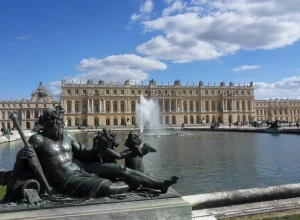Is suffering the ultimate teacher? It’s a question that has resonated through centuries of human thought and experience. We often hear that adversity builds character, that mistakes are the best lessons, and that trials by fire forge resilience. But what if suffering, rather than illuminating a clear path to wisdom, instead leads us down a labyrinth of flawed interpretations, repeated errors, and ultimately, a deeper understanding of human fallibility?
This complex and often unsettling perspective is precisely what emerges from a close reading of Herodotus’ Histories, particularly through the captivating and cautionary tale of King Croesus of Lydia. Herodotus, often hailed as the “Father of History,” masterfully weaves together narratives that are not just chronicles of events, but profound explorations of human nature, ambition, and the precarious nature of fortune. And in the figure of Croesus, he presents a king who believes he has learned from suffering, only to tragically demonstrate the limitations of that very learning.
This post will delve into the conversations and actions of Croesus as depicted in the opening book of Herodotus’ Histories, drawing from scholarly analysis to unpack the historian’s nuanced portrayal of learning, suffering, and the enduring instability of human affairs. We’ll explore how Croesus’ story, far from being a simple tragedy of hubris and downfall, serves as a powerful meditation on whether humans truly possess the capacity to glean lasting wisdom from their misfortunes, and what that means for our understanding of history itself.
Two Threads in Herodotus’ Tapestry: Conflict and Instability
To understand the significance of Croesus’ narrative, it’s crucial to recognize the overarching themes that Herodotus meticulously interweaves throughout his sprawling work. As scholars have pointed out, Herodotus structures his Histories around two dominant, yet interconnected, themes:
- The Grand Conflict Between Greeks and Non-Greeks: This theme, explicitly stated by Herodotus himself, examines the long and often brutal struggle between the Hellenic world and the “barbarian” empires, particularly the Persians. It’s a narrative driven by questions of war guilt, cultural clashes, and the rise and fall of empires. Remarkably, Herodotus prioritizes this theme even over strict chronological order. He begins his account not with the Persians, but with Croesus, the Lydian king who, in Herodotus’ view, was the “first man we know to have harmed the Greeks.” This deliberate choice forces a digression later in the narrative to backtrack and explain the Median-Persian history preceding Croesus, highlighting the paramount importance Herodotus places on this overarching conflict.
- The Universal Instability of Human Conditions: This second theme, perhaps even more profound and philosophically resonant, speaks to the inherent fragility of human happiness and the unpredictable nature of fate. It’s a theme that transcends the specific historical context of Greek-Persian conflict and delves into the universal human experience of change, loss, and the ephemeral nature of fortune. Herodotus introduces this theme early in his proem, stating that he will treat “small and large states of men on an equal basis” because he “knows that human welfare is never stable.” What truly endures in history, he suggests, is the constant flux of change itself.
While the first theme shapes the structure of Herodotus’ work, dictating the order of events and the focus on the Greek-barbarian dichotomy, the second theme provides the interpretive lens through which we understand these events. It colors our perception of actions, motivations, and ultimately, the meaning we derive from history. And it is within this framework of human instability that the story of Croesus truly comes alive.
Croesus: A King Blinded by Fortune and Flattery
Herodotus introduces Croesus as a king of immense wealth and power, ruling over Lydia in opulent splendor. His court is a magnet for wise men and supplicants, and his reputation for prosperity is unparalleled. Yet, from the outset, Herodotus subtly hints at a flaw in Croesus’ understanding of his own situation – a blindness born of his very success.
This blindness becomes starkly apparent in the famous encounter between Croesus and the Athenian sage, Solon. Croesus, basking in his perceived happiness, poses a seemingly straightforward question to Solon: “Who is the happiest of men?” He expects, of course, to hear his own name.
However, Solon, true to his wisdom, offers answers that profoundly challenge Croesus’ self-perception. He names not kings or conquerors, but ordinary individuals like Tellus of Athens and the brothers Cleobis and Biton. Solon’s criteria for happiness are not based on wealth or power, but on a life lived well, characterized by civic virtue, healthy offspring, sufficient means, and a praiseworthy end.
When Croesus, bewildered and indignant, demands to know why he is not considered the happiest, Solon delivers a powerful lesson on the instability of human fortune and the dangers of hubris. He speaks of divine jealousy and the unpredictable nature of fate, emphasizing that “man is entirely accident.” He acknowledges Croesus’ wealth and power, but refuses to pronounce him happy before seeing how his life will end. Solon subtly hints at the absence of a key element in Croesus’ life – the well-being of his family, particularly given that Croesus has a deaf and mute son.
Croesus, however, utterly fails to grasp the profound wisdom in Solon’s words. He dismisses the sage as “foolish” for prioritizing the future over the present, demonstrating a fatal arrogance that stems directly from his current prosperity. He, like his ancestors who ignored the Delphic oracle concerning their dynasty, chooses to remain willfully ignorant, blinded by the dazzling light of his own success.
Herodotus explicitly connects Croesus’ subsequent misfortunes to his rejection of Solon’s wisdom. “After Solon’s departure,” the narrative states, “divine retribution fell upon Croesus, presumably because he believed himself to be the happiest of all men.” Solon’s visit, therefore, is presented as a crucial moment – a last chance for Croesus to awaken to the true nature of his situation. His failure to heed Solon’s warning sets the stage for the tragic events that follow, underscoring the devastating consequences of intellectual and spiritual blindness.
Oracles and the Illusion of Divine Guidance
In the wake of Solon’s departure and the unfolding of personal tragedies – most notably the accidental death of his healthy son – Croesus, instead of reflecting on Solon’s message, turns to a different source of supposed wisdom: oracles. He embarks on a grand scheme to test the most renowned oracles of the ancient world, seeking divine validation for his ambitions and anxieties.
This episode reveals another layer of Croesus’ flawed understanding. He approaches the oracles not with genuine humility and a desire for true guidance, but with a pre-determined agenda. He seeks confirmation of his own desires, particularly his ambition to wage war against Persia and expand his kingdom.
When the Delphic oracle, in response to Croesus’ carefully crafted question, ambiguously proclaims that “if Croesus attacks Persia, he will destroy a great empire,” Croesus is filled with “excessive joy.” He interprets this oracle as a divine promise of victory, completely overlooking the possibility that the “great empire” to be destroyed could be his own.
This misinterpretation is further compounded by another oracle concerning a “mule” ruling Persia, which Croesus, in his hubris, interprets to mean that Persian rule will never end, thus guaranteeing the longevity of his own dynasty. He fails to recognize, as Herodotus later clarifies, that the “mule” is a metaphor for Cyrus himself, a man of mixed Median and Persian parentage.
Croesus’ interactions with the oracles highlight a critical point: wisdom is not simply about receiving information, but about interpreting it correctly. Croesus, blinded by his desires and preconceived notions, hears only what he wants to hear. He selectively interprets the ambiguous pronouncements to fit his ambitions, transforming potentially cautionary warnings into divine endorsements. This self-deception, fueled by his unwavering belief in his own fortune and the infallibility of divine pronouncements (as he wants to understand them), further seals his tragic fate.
A Glimmer of Hope? Cyrus and the “Converted” Croesus
The culmination of Croesus’ blindness is his military campaign against Cyrus and Persia. Despite warnings from wise counselors like Sandanis, who cautions against provoking a war with the impoverished but resilient Persians, Croesus, driven by a thirst for expansion and fueled by his misinterpretations of the oracles, crosses the river Halys and initiates hostilities.
The ensuing conflict leads to Croesus’ decisive defeat and capture by Cyrus. In a dramatic scene, Cyrus, initially intending to burn Croesus alive on a pyre, experiences a sudden change of heart. Herodotus suggests that Cyrus, upon hearing Croesus lament Solon’s wisdom from the pyre, begins to contemplate the instability of human fortune and the shared vulnerability of all mortals.
Cyrus’ “conversion” is portrayed as a pivotal moment. He recognizes his own humanity in Croesus’ plight, fearing retribution and acknowledging that “none of the conditions among human beings is stable.” He orders the fire extinguished, and Croesus is miraculously saved by a sudden rainstorm, interpreted as divine intervention.
This scene appears to offer a glimmer of hope. It suggests that suffering can lead to genuine learning and transformation. Croesus, facing imminent death, finally understands the truth of Solon’s words. He expresses a desire for all rulers to converse with Solon, recognizing the universal applicability of his wisdom. Cyrus, in turn, is moved by Croesus’ experience and seemingly embraces a more humble and empathetic worldview.
The conversation between the two kings after Croesus’ rescue is presented as a moment of shared wisdom and understanding. Cyrus asks Croesus who led him to attack Persia, and Croesus, now humbled, takes responsibility, blaming not external forces, but his own flawed judgment and reliance on misleading oracles. He even offers insightful advice to Cyrus on how to manage his newly conquered kingdom.
At this juncture, it might seem as though Croesus has indeed learned through suffering. He has shed his arrogance, recognized his errors, and emerged from the crucible of misfortune with newfound wisdom. Cyrus, too, seems to have undergone a transformation, demonstrating compassion and a deeper understanding of human limitations.
More reading
The Illusion of Wisdom
However, Herodotus’ narrative takes a darker, more nuanced turn. The apparent “conversion” of Croesus and Cyrus proves to be tragically short-lived, revealing the fragility and ultimately, the illusory nature of learning through suffering.
In the later chapters of Book I, Croesus becomes an advisor to Cyrus, accompanying him on his campaigns. When Cyrus plans an expedition against the Massagetae, Croesus, drawing upon his “bitter experiences,” offers counsel. He warns Cyrus about the “wheel of human affairs” and the instability of fortune, reiterating the very lessons he supposedly learned from his own downfall.
Yet, ironically, Croesus’ advice in this instance is deeply flawed and ultimately contributes to Cyrus’ tragic demise. He advises Cyrus to cross the river Araxes and engage the Massagetae on their own territory, arguing that victory there would be more decisive. Furthermore, he devises a cunning, but ultimately dishonorable, stratagem involving feigned retreat and the use of alcohol to incapacitate the enemy.
This advice is riddled with contradictions and reveals a profound disconnect between Croesus’ professed wisdom and his actual actions. Despite warning Cyrus about the “wheel of fortune,” he encourages him to take a significant gamble. Despite claiming to have learned humility, he appeals to Cyrus’ “male pride,” urging him not to retreat before a woman (Queen Tomyris of the Massagetae). And despite his supposed enlightenment, he proposes a deceptive and morally questionable military tactic.
Croesus’ counsel to Cyrus inverts the wisdom he supposedly gained from suffering. He becomes, unwittingly, a “risk-prone seducer,” leading Cyrus down a path of aggression and ultimately mirroring his own past errors. He repeats the pattern of misinterpreting situations, relying on flawed logic, and ultimately contributing to a tragic outcome.
Cyrus, despite his initial moment of empathy and humility, also falls prey to the seductive allure of ambition and flawed advice. He disregards Tomyris’ warnings and accepts Croesus’ counsel, demonstrating that even a seemingly “converted” ruler can relapse into hubris and poor judgment.
The disastrous campaign against the Massagetae culminates in Cyrus’ death and the near annihilation of his army. Queen Tomyris, in a chilling act of retribution, dips Cyrus’ head into a skin filled with blood, fulfilling her threat to “satiate” his thirst for blood.
This tragic end underscores the central pessimistic message of Herodotus’ narrative: learning through suffering is not a guaranteed path to wisdom, and even when lessons are seemingly learned, they can be easily forgotten, misinterpreted, or tragically misapplied. Croesus, despite his suffering, fails to truly break free from the cycle of flawed judgment and ultimately becomes an instrument of further tragedy.
The Cycle Continues: Croesus and Cambyses
Herodotus extends this pessimistic outlook even further in Book III, with a brief return to Croesus in the context of Cyrus’ son and successor, Cambyses. Croesus, now an elderly advisor in the Persian court, offers wise and moderate counsel to the increasingly erratic and tyrannical Cambyses.
He urges caution and forethought, warning against excessive cruelty and the dangers of provoking rebellion. However, Cambyses, already descending into madness and megalomania, dismisses Croesus’ advice, even ridiculing him for his past misfortunes and blaming him for Cyrus’ death.
This final appearance of Croesus reinforces the cyclical nature of blindness and flawed learning. Croesus, despite his genuine attempts to offer sound advice, is once again ineffective. His wisdom, even when present, is powerless to prevent further tragedy. Cambyses, like Croesus before him, succumbs to hubris and flawed judgment, demonstrating the seemingly inescapable human tendency to repeat past mistakes.
Conclusion
Through the intricate and tragic narrative of Croesus, Herodotus presents a profound and ultimately pessimistic vision of human learning and the lessons of history. While suffering may offer moments of clarity and insight, it does not guarantee lasting wisdom or prevent the recurrence of error.
Croesus’ story is not simply a morality tale about hubris and downfall. It is a deeper exploration of the fragility of human wisdom, the seductive power of ambition, and the cyclical nature of history. It questions the very premise that humans can reliably learn from their mistakes and break free from patterns of flawed judgment.
Herodotus’ portrayal of Croesus suggests that even the most profound personal experiences, the most seemingly transformative moments of suffering and insight, may not be enough to fundamentally alter human nature or prevent the tragic repetition of history. The “bitter lessons” of Croesus, in the end, serve not as a guide to enlightenment, but as a poignant reminder of the enduring human capacity for blindness, self-deception, and the tragic limitations of learning through suffering.
This unsettling conclusion, far from being nihilistic, offers a powerful and enduringly relevant perspective on human history. It encourages us to approach the past not with naive optimism about progress and learning, but with a critical awareness of human fallibility and the constant potential for tragedy to repeat itself. Perhaps, the true wisdom to be gleaned from Croesus’ story lies not in the belief that suffering automatically leads to enlightenment, but in the sober recognition of the enduring human struggle to truly learn, and the ever-present risk of repeating the bitter lessons of the past.









support our project
At History Affairs, we believe history belongs to everyone.
donateYour contribution helps us keep this global archive open, free, and growing — so people everywhere can learn from the past and shape a better future.
know the present
Defense Tech Needs the State, Not Less of It
Trump Era or The New Imperial Age
America First, Venezuela, and the Trap of Old Habits
Why the AI Race Has No Winner
reading more
Women’s Voices in the French Revolution
The Election of 1800: How a Bitter Battle Redefined American Democracy
Arsinoe IV: Cleopatra’s Forgotten Rival
The Rebecca Riots: A Radical Uprising in 19th-Century Wales
The Indigenous Women in the Battle of Little Bighorn
Roman Senate: Backbone —and Burden—of a World-Conquering Republic
The Phoney War of 1939-1940: The Calm Before the Storm
Walt Whitman: A Voice of America
Bringing Aden’s Tawila Tanks Back to Life
Canada’s Historic Treasures: 5 Must-Visit National Historic Sites
The West Point Eggnog Riot of 1826
Joan of Arc’s Trial and Execution